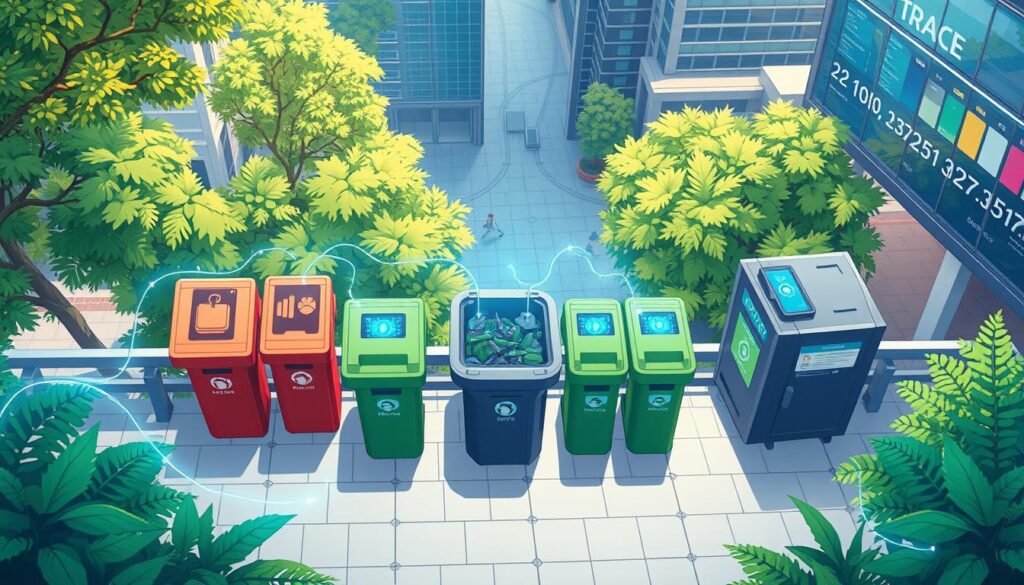Ever thought about how tech can change waste management? Today, with a focus on sustainability, AI is changing how we deal with trash. This change could also bring big economic gains. Let’s dive into how AI and smart waste management are changing the game.
AI-powered recycling bins lead this change. They use sensors, cameras, and learning algorithms to sort waste. These bins help recover resources, encourage creativity, and make money. They also help the environment and create jobs.
By turning waste into valuable items, they support a circular economy. This approach is making trash valuable and shaping the future of waste management.
Understanding the Revolution in Smart Waste Management
Old ways of handling waste have big problems, like low-value plastic and contamination. But, a big change is coming, thanks to artificial intelligence (AI). AI is changing waste management, making waste sorting better, recycling efficiency higher, and opening up new ways to make money from data.
The Role of AI in Modern Recycling
AI systems like Renie Bins are leading this change. They use smart technology to keep plastic waste clean and pure. This not only boosts recycling efficiency but also lets companies make money from the data they collect.
Economic Opportunities in Smart Waste Management
AI in waste management brings big economic benefits. It creates plastic credits from waste records, making recycling profitable. As we focus more on the environment, AI is changing how we manage waste. It turns trash into something valuable and opens up new economic opportunities.
AI-Powered Sorting Systems: Transforming Waste Processing
The waste management industry is changing fast, thanks to AI-powered sorting systems. These systems use robots, machines, and advanced algorithms to change how we sort waste. They make recycling better, reduce contamination, and speed up waste processing.
These systems are great at waste identification and automated sorting. They have advanced sensors and cameras to spot and sort different waste types. This means better recycling, with higher-quality materials being reused.
The use of machine learning makes these systems even better. As they sort more waste, they get smarter and more accurate. This is a big step towards a more sustainable future.

AI-powered sorting systems are changing waste management for the better. They use advanced technology to make recycling more efficient and environmentally friendly. This is a big step towards a greener future.
AI in Smart Waste Management: Turning Trash into Cash with Intelligent Recycling
The way we manage waste is changing fast, thanks to AI. Smart bins like the CleanCUBE from Ecube Labs are now collecting valuable data. This data helps businesses understand what people buy and how they behave, opening up new ways to make money.
Data Monetization Through Smart Bins
Smart bins, like CleanFLEX from Ecube Labs, use advanced sensors to track how full they are and what’s inside. This helps waste management companies save money by reducing fuel use and improving routes. Companies like Compology use similar technology to track waste levels and types, helping them serve customers better and save on costs.
Generating Revenue from Plastic Credits
Plastic credits are another way to make money from waste. For example, ecoATM pays people for old phones and tablets, keeping them out of landfills. Bin-E’s smart bins also help by sorting and compressing waste, making collections more efficient and saving fuel.
Cost Reduction Through Automation
AI helps sort waste faster and more accurately than humans, thanks to systems like EvoEco’s EvoBin. Robots with AI sensors can learn and get better over time. This automation cuts down on costs and makes waste management more efficient, turning trash into something valuable.

Route Optimization and Predictive Analytics in Waste Collection
AI algorithms are key in smart waste management. They help optimize waste collection routes and use predictive analytics. These systems analyze data on waste patterns, traffic, and more. This way, they find the best routes, saving time, fuel, and cutting down on emissions.
Predictive analytics powered by AI forecast waste trends. This helps cities and waste companies plan better. They can get ready for seasonal changes and big events. With AI, you can make smart decisions, improve efficiency, and use resources wisely.
Using AI for route optimization and predictive modeling boosts waste collection efficiency. It lowers costs and reduces environmental harm. This approach makes your operations smoother and shows your commitment to sustainability. It benefits your community and the planet.
Legal Disclaimer for AIover40.com
Welcome to AIover40.com. Please note that the information provided on our blog, including comments and insights, is intended for informational and entertainment purposes only. This blog is not a source of professional advice.
No Professional Advice
The content shared on this blog is designed to provide helpful information on the topics discussed. However, this blog does not provide professional advice and should not be used as a substitute for advice from a certified professional in the fields of artificial intelligence, finance, healthcare, or any other professional domain. The use of any information provided on this blog is solely at your own risk.
Accuracy and Completeness
While we strive to keep the information up to date and correct, we make no representations or warranties of any kind, express or implied, about the completeness, accuracy, reliability, suitability, or availability of the website or the information, products, services, or related graphics found on the website for any purpose.
Limitation of Liability
In no event will AIover40.com, its affiliates or its representatives be liable for any loss or damage including without limitation, indirect or consequential loss or damage, or any loss or damage whatsoever arising from loss of data or profits arising out of, or in connection with, the use of this blog.
Consent
By using our blog, you hereby consent to our disclaimer and agree to its terms.
